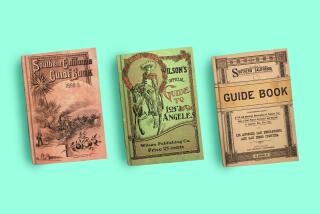Book Review : The Wit, the Wisdom and the Ambushes of a Grand Poseur
- Share via
Flying Visits: Postcards From the Observer 1976-1983 by Clive James (Norton: $14.95)
On and off over seven years, the Australian-born columnist Clive James traveled about the world under instructions from his editors at the Observer to concentrate on first impressions and avoid the deep stuff. He was to follow the first branch of the forked dictum that says writing about foreign places should be done either at the end of one week or at the end of six months.
James visited as a missile visits; fast and explosively. He debarked warily from his airplane and re-boarded as soon as he could. He is truly happy in an airplane.
Airplanes and airports are his movable womb; and as for the world, it is very foreign indeed. James adopts for his drop-in travels the traditional boorishness of the British abroad; gibing at local oddities, imitating people’s accents, and generally wielding the persona of a spoiled younger son of the nobility sent on the Grand Tour largely to get rid of him. It is a pose, of course, allowing him to spring out and ambush us with his considerable wit and frequent sensibility. And like a good pose, it reflects something of the truth underneath.
A fair amount of “Flying Visits” seems as yellowed as the newsprint it was originally printed upon. James tends to enter in a cloud of cliches and then work out into something more idiosyncratic.
Still, watch for ambushes. When an acquaintance, in the typical New York conversation consisting of a paraphrase of yesterday’s newspaper, drones on about a rise in the crime rate among people who know each other, James mutters that, clearly, “New York is becoming a friendlier place.”
What is to be prized in James is not the evocation of a place, but the odd insight or imprecation. His sketch of Disney World, which he plainly hates, is full of the obvious put-downs until suddenly he is less obvious. Considering its claim to educational value in its grand representations of the future, he writes: “It teaches very little worth learning because it empties the significance from any subject before beginning to expand it.”
What James really requires is a target. His account of the Queen of England’s visit to California, and of the maneuverings of the British and American press covering it, is first-rate social comedy. At one point, he huddles in the rain beside a British photographer who carries “an infra-red lens for taking pictures of the Princess of Wales through brick walls at night.” He spots Zsa Zsa Gabor wearing a purplish fur coat “taken from some species of animal to which she probably represents the sole source of danger.”
James dances best on his toes, or rather, on the claws on his toes. His description of Margaret Thatcher touring China, in terms of a Ming pottery figure, is lethal. He recalls the Chinese tradition of fearsome empresses, and we get Mrs. Thatcher as “the Fourth Strong Woman in Chinese history, an invader from the strange kingdom of the Two Queens, in which one queen stayed at home minding the palace while the other came marching towards you carrying a severely cut handbag like an Anyang Shang dagger-axe with a jade blade.”
Yet finally, he is impressed. “She deserves credit for her iron guts even if you think her brains are made of the same stuff.”
Traveling with James can be like doing the sights in a taxi where the driver’s complaints drown out the scenery. Boorish and blithe, his writing follows a tradition not of empathy but of estrangement. He sends his feelings on a journey and plods behind, recording them. The style has its limitations but it also has its uses. Ferocity and moroseness can knock out of a place perceptions that admiration and understanding fail to get at.


